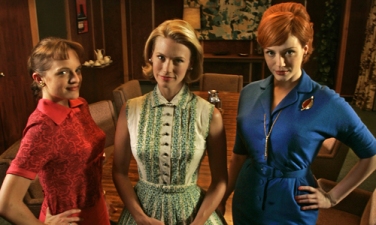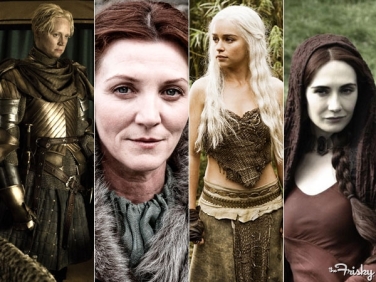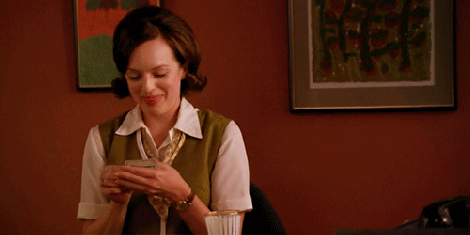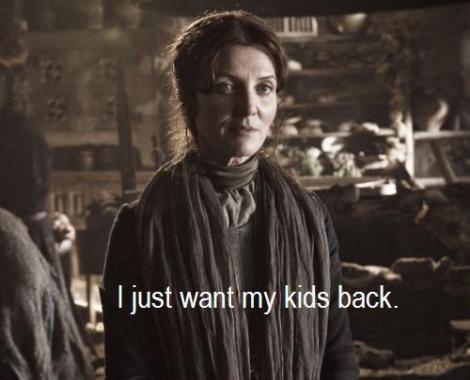Based on their loglines alone, you wouldn’t think that Mad Men and Game of Thrones, two of the finest cable dramas today, are feminist works. The former takes place in 1960’s New York, and centers around a group of ad men who drink, privately mock the occasional “Zou Bisou Bisou” performance, casually whore their women out for the sake of big business, and celebrate with more drinking. The latter is set in a fantasy world where high-born women are free to comfort themselves with the illusion of power, even though a sadistic preteen boy is ultimately calling the shots.
And yet both shows, which embarrassed us with riches by airing in one two-hour block on Sunday nights earlier this year, are inspired in that they take the effort to make their female characters far and away the strongest, morphing their apparent weaknesses into strengths with the ease of Harry Crane knocking down a bag of sliders. In these worlds, women may not get what they want, but at least they know what they want — which is more than you can say for the men.
SPOILERS FOR MAD MEN SEASON 5 START HERE. IF YOU PREFER PEOPLE EMBRACING A LIFE OF CELIBACY TO GUARD A REALLY LARGE WALL AND SCOFFING AT PREPOSTEROUS RUMORS OF DRAGONS BEING BORN OVERSEAS, SKIP TO THE MIDDLE OF THE ARTICLE
The fifth season of Mad Men, a haunting, staggering showcase of five men clawing at every angle for a sense of relative normality, discovering horrifying failures within every apparent success, slowly revealed itself to be about three women the entire time: new mother Joan Harris, “actress”-turned-copywriter-turned-actress(?) Megan Draper, and tree-smokin’, boundary-fucking pioneer Peggy Olson. Each begins the season working in the offices of Sterling Cooper Draper Price, but as the company gradually transforms into a haunted house, two of them manage to get out. The other makes a conscious decision to accept the burden of the company, not out of loyalty (which flies out the window the moment Pete Campbell struts into her office with his figurative pimp cane), but for her child’s well-being and her own dramatically-growing independence.
Speaking of Mr. Campbell, you could argue that this season was as much about his gradual realization that his marriage was irreversibly damaged than it was about any of the women. But then you could also argue, given his lightweight performances in his litany of fight scenes, that he’s also the biggest woman in the office (sorry, but the bait had to be taken on that one. I’ll only do it once per show, promise. (The second is about Joffrey)). Likewise, you could argue that Don is the domineering center of the season, much as he was last year. But by that final scene, we can confirm what Matt Weiner has led us to believe the entire time—that this isn’t a man capable of change, try as he might. Notice the shot in the finale where the five partners of SCDP gaze out the windows of their new office space. All of them take up exactly one frame in the window, save Don, who gets split into two frames. As long as Don Draper continues to allow Dick Whitman to coexist, the two aren’t capable of living in harmony. Pete tells Don, “I’m going to have the same view as you now,” yet part of Don knows he is never going to have a perfect view. By episode’s end, Pete is beginning to understand that about himself as well.
The best view in that scene belongs to Joan, who stands in the center of the men, and for good reason: with Lane gone, Joan’s five percent of the company suddenly carries a great deal more power (she’ll be able to play the role of tie-breaker when the other partners are in a stalemate). Likewise, her one-night fling (the heinousness of the situation in principal makes it easy to forget that Jaba the Jaguar—by all signs we saw—wasn’t violent with her, just generally disgusting and unpleasant) has gained her a lifetime’s worth of leverage from four men who will always feel a certain amount of shame in her company (okay, three, we’ll exclude Pete again—but if Roger hasn’t admitted to himself what he did yet, a future acid trip will surely take care of that). Joan was the first woman to kick ass early in the season, when she decided that she could support her child without the help of a husband who wasn’t there and a lover who offered only monetary aide. The moment when she told Greg it was over surely got a fist-pump from every viewer, male or female. This was the Joan we’d been waiting for the entire series—the one who realizes not only that the pretense of needing Greg has vanished, but that the pretense of feeling inferior to Greg is laughable. This was a Joan that would have picked up the bluntest object available to her when she was alone with Greg for a certain scene in season three. She was well on the road to understanding she didn’t necessarily need a man to be the woman and the mother she wanted to be, that if she had no other choice than to go it alone, then she was more than capable of doing so.
So, this being Mad Men and all (Mad Men’s second-strongest asset is that it is never, ever predictable; its strongest asset is that it’s secretly, wickedly funny, maybe the funniest show on television), so of course it couldn’t be as easy as all that. First, a lawsuit from Greg confirmed that, yeah, not so fast, money is going to be an issue here. Not long after, Pete Campbell walked in with the laziest “so I heard the funniest story last night” line he could muster. Again, Joan found her future in the hands of a man—a man who can make her one of the most powerful women in New York in a single night—and found herself with a choice. Now, the easy read on the choice Joan makes is that it’s the wrong one—it demeans her, it betrays her core values, it could ultimately lead to an emotional detachment that makes it not worth the money (and admittedly, her final consolation that he should have just given Lane “what he wanted” was the most troubling sign thus far)—but her decision is also a calculated one. Joan must have thought it disparaging at first, yet ultimately realized that this was an opportunity few women get—and men simply don’t get. If she can get through one night, she essentially become financially secure not just for her future, but for her child’s future. It becomes a mother’s choice, and so it slowly becomes less of a choice. When Don arrives too late to save her, we’re led to believe that perhaps Joan wouldn’t have gone through with it if he had arrived on time. But even if she was saddened by the reveal of Don’s stance in the matter, the ultimate ramifications of her decision surpassed Don Draper’s opinions on the matter regardless. Before she leaves, she tells Don, “I know what I’m doing.” And after witnessing her reject Greg and Roger throughout the season, we should have enough faith in Joan Harris at this point to believe her, regardless of Don’s timing. Besides, this is Don Draper we’re talking about—a man who always assumes his opinions and presence take precedence over larger issues he fails to grasp in the lives around him.
Take his relationship with Peggy Olson as the ultimate example of this. When she delivers her resignation to him, it comes more out of nowhere than Lee Garner Jr.’s penis in the copy room. He acts as though a Howard Dawes suckerpunch has just been thrown at him, unaware that he should have seen this coming for a long time now. But just as Don is quick to dismiss The Beatles’ “Tomorrow Never Knows” as a noisy fad that won’t hold up to the test of time, he fails to recognize several key changes in the way America operates—a motif Peggy has embodied since the series began—that ultimately leads to her pursuit of a new career, one free of but not ungrateful towards, the man who unknowingly helped groom her into a pioneer for successful businesswomen in America. When Peggy steps into the elevator shaft at the end of that episode, she takes one last look at Joan—still confined to the office that she sold her soul to be a part of—and can’t help but smile before leaving Sterling Cooper Draper Pryce for the final time. As viewers, we don’t see the smile coming after the scene with Don, which only reinforces what is now a certainty– that Peggy Olson knows exactly what the fuck she wants.
Megan is still in the middle of Joan and Peggy, and though she drifts from Don near the end of the season, her future is perhaps the most murky. When she stares down the same elevator shaft earlier in the season, she sees a long, dark hole towards nothingness. Like Peggy, she is able to escape from the office, and she does it on her own terms. She follows her dreams, albeit only with Don’s permission, and as his resistance to her dreams has elevated, the distance between them has opened up. As another powerful woman once told Don, he should “tell her that he only likes the starts of things.” Megan’s path will only certainly continue to diverge from Don’s, another reminder that he’s helpless to overcome his ways and thus, time and time again, rendered powerless before the whims of women who continue to evolve and ignore his core dispositions, (though perhaps his frequent roleplaying fetishes see him subconsciously acknowledging this shift in dynamics, even enjoying it). We’ll probably see the dissolution of another Draper marriage, but then again, that’s Mad Men‘s second-greatest strength — we never really know.
THIS IS WHERE THE MAD MEN SEASON 5 SPOILERS END. IT IS WHERE THE GAME OF THRONES SEASON 2 SPOILERS BEGIN. THIS IS AS FAIR AS WARNINGS GET.
For as indebted as Mad Men and Game of Thrones are to the great shows that came before them, they have carved a certain niche to themselves. The Wire, The Sopranos, The Shield, and Breaking Bad all contain strong, well-written female characters, played by some very talented actresses. But none of them help drive the plot along or create lasting ramifications for the men who dominate their stories. Those worlds evolve and change based on decisions made by Tony Soprano, Walter White, Jesse Pinkman, Vic Mackey, Jimmy McNulty, and Stringer Bell. Not the case with Mad Men, and certainly not the case with Game of Thrones.
Okay, we can get one thing out of the way: you’re going to see more breasts than penises on this show. All right, a lot more (though you will get some penises. Hodor.) But for a show that features eight or nine badasses that make the gangsters from Boardwalk Empire look like the kids from Jersey Shore, George RR Martin’s world takes at least as much time crafting fully-realized, independent female characters who make decisions that have their implications felt throughout its fictional realm of Westeros. You could go as far as to argue that it’s the women of the Seven Kingdoms who hold the real power (as well as King Joffrey, who, come on, is a bit of a girl. (Sorry, that’s my second and last offense.))
Take Cersei Lannister. She practically spends her time during the sack of King’s Landing giving Sansa Stark a crash-course in how the world of Westeros can be taken over by any woman of power, so long as that woman is ready to use the one weapon no man can overcome—the one between her legs. Many of the male soldiers and lords in the show are deceptively narrow-minded—even fan favorites like Robb and Jon—so we can immediately see the advantages in Cersei accepting her world-weary philosophy. Like Joan’s decision in Mad Men, it’s a bit soul-crushing, a refusal to let the harsh realities of life go unfiltered for the sake of power, and it points to ugly political and social parallels between Martin’s medieval war ground and our own country (cue Parks and Recreations’ Ben Wyatt: “They’re telling human stories in a fantasy world!”)
Cersei’s foil in some sense is Catelyn Stark, matriarch of the northern family, who has not abandoned her dignity in the slightest, but instead takes power through her own rampant decisions, fully aware that she will be ultimately forgiven as a woman of noble birth. Cat, tellingly, is one of the more divisive characters in both the books and the show. I’ve heard from many readers and viewers that she’s their least favorite character, that the want her to die, and most alarmingly, that they want “that bitch to die.”
I can’t explain much of that disdain. I can see why someone would find Catelyn a bit boring, as much of her arc sees her serving (rarely successfully) as a diplomat, giving us eyes into what’s going on in Robb’s camp, what’s going on in Renly’s camp, so forth. But I think a large part of the animosity directed at her stems from a belief viewers of the oft-brutal war series don’t want to hear—that she’s right. What’s perceived as irrational, what many male characters dismiss as insanity, is by all accounts completely logical. By freeing Jaime Lannister near the end of season two in an effort to get her daughters yet, she’s doing what any mother in her right mind—what any caring mother watching the show—would do. She’s taking a gamble on releasing a dangerous killer, but she’s doing so to save bloodshed, to end the war on her terms, reclaim what family she has left, and resume peace. She’s finally putting aside her revenge, and in doing so, becomes the only one doing the right thing.
Her soldiers can’t accept this line of reasoning. Their disappointment and anger resonates with the viewer, and in doing so, reveals something about the way we perceive entertainment. We don’t want peace either. We want that bloodshed. We want to see Joffrey’s head on a stick, and we want Robb to be the one to do it. We’re trying to get the most entertaining outcome, and Catelyn’s trying to get the one that makes the most sense in her world. But all we see is a woman trying to halt that fun for us, and rather than consider whether we should be looking inwards in ourselves to empathize with her plight, we arrive at the shorthand “I want that bitch to die.”
This is to say nothing of Arya Stark, Daenarys Targaryen, Brienne of Tarth—even Sansa Stark to an extent. What’s left to say, other than they’re the most compelling, fully three-dimensional women that you’ll find anywhere on TV other than Mad Men. Game of Thrones has become such a sensation since it’s premier that you’d think we’ve yet to begun scratching the surface of other shows building from its model. Hopefully they don’t forget the most important detail—that if you want to craft worlds this detailed, this believable—you need to get inside the minds of every character. Not just the ones with the biggest sword.
(Okay, I’ll apologize for that last line too.)





Don’t forget Margaery Tyrell, Ygritte or Yara Greyjoy.
I disagree about Catelyn’s decisions being logical or that the viewers hate her for trying to bring peace and cut into our entertainment. The likelihood of the Lannisters actually returning the Stark girls was very low, which is what made her decision so stupid. The north is actually more likely to be able to bring peace when they still have Jaime captive and thereby have something to bargain with the Lannisters over. An exchange of hostages could have worked, but not the idiotic way she did it, and even if it’d worked, the return of two girls wouldn’t have done anything to avenge Ned or end the war.
I wasn’t trying to argue that she made the smart decision- perhaps ‘logical’ was a poor choice of word. I fully agree that there was little chance of success- actually, there was no chance of success, since we know that the Lannisters don’t even have Arya to trade. All I was arguing is that a lot of viewers/readers don’t step back and empathize with Cat’s decision-making process from the viewpoint of a mother, which is pretty much what she’s all about through her arc. All of your points are valid, just as the majority of the northmen who turned on her would phrase it themselves- but I think Robb was the only one to forgive her by conceding that she was acting in the best interests of her own family, as any mother would.
Very true that we shouldn’t forget Margaery, Ygritte, or Yara, as well as Melisandre, and characters we’re going to be introduced to soon like Meera, The Queen of Thorns, and Arianne. The abundance of well-developed female characters really is staggering.